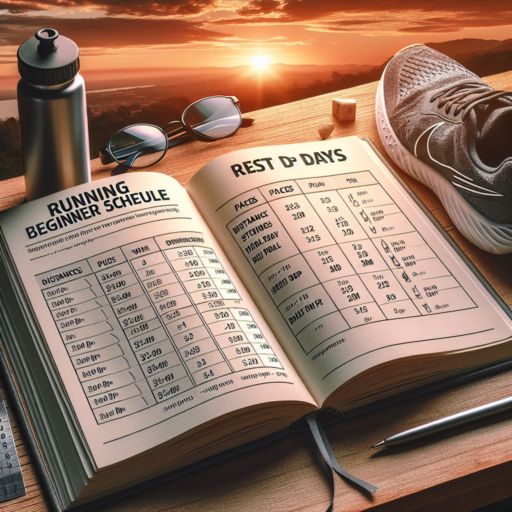What is a good running routine for beginners?
For those just stepping into the world of fitness, initiating a running routine might seem challenging. However, the best part about running is its flexibility – you can start at your own pace and gradually build up intensity. A good running routine for beginners consists of a balanced combination of walking, light jogging, and running.
Warm-up and Cool-down
Start by incorporating a thorough warm-up and cool-down into your routine. You can begin with a five-minute brisk walk which aids in preparing your body for the actual run. Similarly, cooling down, which could again be a slow-paced five-minute walk followed by stretching exercises, helps bring your heart rate back to normal and enhances muscle recovery.
Walk-Run Method
The Walk-Run Method is highly recommended for novices. Popularized by Olympian Jeff Galloway, this involves alternating intervals of running and walking. For instance, you can begin with one minute of running and then walk for two minutes, repeating the cycle for the duration of your exercise session. This method allows you to cover more distance while mitigating the risk of injury and exhaustion.
Consistency is Key
While duration and speed are important, what’s vital for a beginner is consistent practice. It’s better to run for shorter durations regularly, rather than attempting a long run once and being too sore the following days to continue. Remember, your initial goal should be building stamina and making running a habit more than achieving high speeds or long distances.
How do I train myself to start running?
Starting to run is no small feat, but with a solid plan in hand, you can definitely turn the tables around. Let’s discuss some crucial aspects one by one, to sketch a methodological approach.
Create a Concrete Plan
Prepare a run schedule: Begin by setting a weekly plan, starting with alternations between walking and running. For example, run for five minutes and walk for one, gradually increasing the duration of running and reducing that of the walking. Make this process more effective with a sports watch that tracks your movement and progress, catering as an excellent aid towards your mission.
Set Realistic Goals
Start slow: The key to creating a steady running habit is to start slow. Setting unrealistic goals can lead to demotivation and injuries. Make sure you are comfortable with the running duration and speed before ramping up the workout. Your sports watch can also help you keep track of your pace and tell you when to speed up or slow down, ensuring a safe and effective training regimen.
Concentrate on Nutrition and Recovery
Eat healthily and stay hydrated: Proper nutrition also plays an essential part in your running training. A balanced diet, enriched with proteins and carbohydrates, ensures you have the needed energy to complete your run, and aids in speedy recovery. Keep track of your water intake with a sports watch that can remind you to stay hydrated before and after your run.
No se han encontrado productos.
How to run 5km for beginners?
Starting a new running routine can feel overwhelming, especially when gearing up for a 5km run for the first time. Knowing the right techniques and strategies not only helps prevent injuries but also makes the process more enjoyable and achievable.
Starting Slow and Gradual
Beginning with a walk-run approach can benefit beginners significantly. Instead of attempting continuous running, intersperse short running intervals with longer walking breaks. Gradually, you can increase the running intervals and decrease the walking time. Use a sports watch to keep a tab on these intervals and pace.
Consistent Training and Rest
Being consistent with your training is crucial to build running capacity. Ensure a regular training schedule of at least three days a week. Furthermore, including rest days in your training calendar is as important as running days. It allows your body to recover, build strength, and prevents burnout.
Evaluate Progress with a Sports Watch
Sports watches are a handy tool for beginners who are aiming for a 5km run. These watches can help monitor your heart rate, calories burned and provide essential data about your running pace and intervals. This allows you to track your progress and plan your training intervals efficiently.
How many hours should a beginner run?
When embarking on a new running regimen, beginners often face the question, how many hours should a beginner run? This is a key question, and the answer plays a vital role in setting an appropriate pace, preventing injuries, and ensuring steady progression. Although the answer can vary depending on fitness levels, age, and individual goals, a generalized approach can be established for guidance.
Starting Slow
Initially, the measure isn’t the «hours» a beginner should run, but rather the «minutes.» Starting slow is a must. Most experts suggest beginners to start with 20-30 minutes of running, three times per week, as a safe and effective starting point. This can equate to approximately 1.5-2 hours of running per week. It’s however essential to incorporate walking breaks until your body adapts to the new exercise routine. Attaining consistency at this stage reinforces your running habit and prepares your body for future progressions.
Gradual Increment
Increasing the running duration gradually is known as the «10% rule«, which means you should only increase your weekly running duration by 10% from the previous week. For example, if you’ve been running for two hours in a week, the next week should only see an increase of about 10 minutes. This gradual increment ensures your body has ample time to adjust and recover, reducing the risk of injury.
Emphasizing on Rest
An important aspect to note, intertwined with running hours, is the significance of rest. Rest days are as essential as running days. They allow your body to recover, rebuild, and strengthen. Hence, while determining how many hours a beginner should run, incorporating sufficient rest days is crucial to promote a balanced and sustainable running routine.




